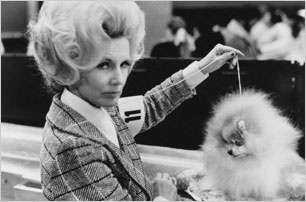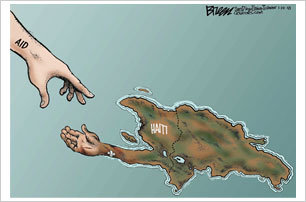
Trust No Bankers The financial industry has always been wrong about the dangers of regulation.
Posted Friday, Jan. 15, 2010, at 3:30 PM ET Predictably, Wall Street and the banking industry don't like President Obama's plan to tax banks to help pay for the bailout. JPMorgan Chase CEO Jamie Dimon, an Obama supporter, said, "Using tax policy to punish people is a bad idea." Republicans generally denounced it, with RNC Chairman Michael Steele noting "this money has already been paid back by the banks" and calling it a "punitive tax" that "will hurt Americans' savings and discourage job creation at the worst of economic times."
Predictably, Wall Street and the banking industry don't like President Obama's plan to tax banks to help pay for the bailout. JPMorgan Chase CEO Jamie Dimon, an Obama supporter, said, "Using tax policy to punish people is a bad idea." Republicans generally denounced it, with RNC Chairman Michael Steele noting "this money has already been paid back by the banks" and calling it a "punitive tax" that "will hurt Americans' savings and discourage job creation at the worst of economic times."
It would be a lot easier to accept this line of reasoning if JPMorgan Chase didn't have about $40 billion in FDIC-guaranteed debt outstanding, and if the Federal Reserve didn't have $27 billion of Bear Stearns assets on its balance sheet (which it had assumed to help JPMorgan take over Bear). Big banks might have paid back the money they borrowed under the Troubled Asset Relief Program, but they're still benefitting hugely from the bailouts and taxpayer supports enacted after the crisis.
But there's an even better reason to dismiss their concerns. A study of recent—and not so recent—financial reform and regulation yields two rules. Rule No. 1: The banks have no idea what kind of regulation is good for them. Rule No. 2: If you ever think the banks have a point, remember Rule No. 1.
This rule dates almost to the beginning of American history. Many commercial banks in the United States opposed the creation of the first and second national banks of the United States in the late 18th and early 19th century. They saw the proto-central bank as competition, since it was essentially a congressionally chartered private bank that would compete with them. As a result, the United States, in contrast to economic rivals England and France, lacked a central bank in the 19th century—despite periodic banking panics and failures, the severity of which could have been mitigated by a central bank. It was only after the Panic of 1907 that forces were set into motion for the creation of a central bank. Would it surprise you to learn that many bankers and their political allies opposed the creation of the Federal Reserve? Didn't think so.
The same dynamic returned in the 1930s, after Wall Street and the commercial banking sector had essentially destroyed itself. The banking industry had proved utterly incapable of ensuring the safety of its customers' deposits. Yet when the Roosevelt administration proposed the establishment of an industry-funded Federal Deposit Insurance Corp., Francis Sisson, then president of the American Banking Association, called deposit insurance "unsound, unscientific, unjust, and dangerous." After all, "overwhelming opinions of experienced bankers are emphatically opposed to deposit guaranties which compel strong and well managed banks to pay the losses of the weak."
Sisson's objections notwithstanding, deposit insurance went into effect in January 1934 and proved remarkably successful in restoring confidence in the banks. "Rarely has so much been accomplished by a single law," said John Kenneth Galbraith. Of course, deposit insurance doesn't prevent banks from failing. But at least when they do, they do not wipe out their depositors.
On Wall Street, meanwhile, the industry went nuts when FDR proposed the establishment of the Securities and Exchange Commission, which forced disclosure, the registration of securities, and federal oversight of exchanges. The industry led a vicious campaign against any and all regulation, accusing FDR and his crowd of being nothing more than a bunch of Communists. No regulation was necessary; Richard Whitney, then chairman of the New York Stock Exchange, actually called the NYSE a "perfect institution." (Whitney would later be busted for grand larceny and serve time in Sing Sing. Among his crimes: stealing from the NYSE's gratuity fund and—the ultimate in WASP betrayal—embezzling from the New York Yacht Club.)
 Why Jon Stewart Failed To Make John Yoo Squirm
Why Jon Stewart Failed To Make John Yoo Squirm The New Season of 24 Gets Everything Wrong About New York
The New Season of 24 Gets Everything Wrong About New York How a Scott Brown Senate Win in Massachusetts Could Sink Health Care Reform
How a Scott Brown Senate Win in Massachusetts Could Sink Health Care Reform Attention, Slate Readers in Washington, D.C.: Join Us for a Discussion About Google and China
Attention, Slate Readers in Washington, D.C.: Join Us for a Discussion About Google and China Is Gawker's "Apple Tablet Scavenger Hunt" Illegal?
Is Gawker's "Apple Tablet Scavenger Hunt" Illegal? Jack Shafer: Washington Post Drools Over Obama's New USAID Chief
Jack Shafer: Washington Post Drools Over Obama's New USAID Chief











